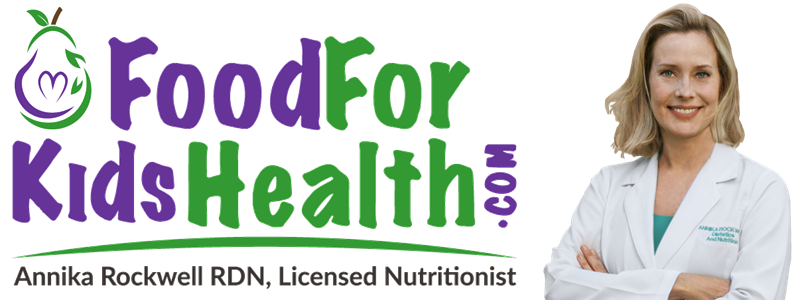Nutrition Guidelines for Infants and Toddlers:
Healthy Fats and Foods vs Media Hype and Commercial Foods
There is a lot of misinformation out there about correct nutrition for kids. A few examples include: fats (critically important!), soy (terrible!), and vegan diets (terrible!).
Some of the reasons for this misinformation include that pediatricians only spend 1 hour in medical school studying nutrition, and the nutrition info we get as consumers are created by the big money driven companies who make infant formula and kids cereals. They are the ones who funded design of the “Food Pyramid” (a joke of a nutrition plan). They all have vested interest in marketing their highly processed junk foods & cereals to all populations, including children. And they don’t even discuss the “healthy fats” which are so critical.
Ideal Fat Intake for Infants Age 0-2
From birth through 2 years of age, your infant should be getting 35-50% of calories from fat in his/her diet. This is roughly 6 Tablespoons of fats per day. 10-15% of calories from protein, and the rest from carbohydrates. Health problems such as constipation, diarrhea, gas, skin rashes, frequent colds, ear infections, hyperactivity, aggressiveness, can all be improved (and even prevented) using good nutrition.
About 35-50% of the calories in breastmilk come from fat, depending on the mother’s diet. Until 2 years of age, infants should continue to consume approximately the same amount of fat in order to thrive. Healthy fats are incredibly important for their brain, neurological development, and organ & bone growth.
Human studies show that infants under age 2 who consumed a low fat or fat restricted diet suffered from growth failure (height & weight). Ideally, healthy fats should not be restricted until the child has finished growing. While adults guidelines are to consume 30-40% calories from fat, an infant/child should consume 40-50% of calories from fat.
It may seem like a lot, but it just takes a few servings of coconut/coconut oil, avocado, chicken, chicken liver, duck, fish/cod liver oil, olive oil, raw grass-fed organic milk and butter (Grass fed contains CLA, vit A&D).
Vital Choice is a recommended source for fish & fish oil products.
Will my child get fat consuming so much fat?
Some parents may be concerned about excessive weight gain in children, but they should never restrict healthy fat consumption- it is critical for proper brain and nerve development in children.
Problems with excessive weight gain are often related to excessive consumption of sugary junk foods, salty snacks, fried foods (unhealthy fats), and sweetened drinks and juices.
What are the healthy fats for kids?
Here are 4 types of fats worthy of your attention. Make sure your child gets very high quality, unrefined, unprocessed, organic fats. They become the building blocks of her brain and organs.
Percent = ideal ratio for total fat intake:
- Saturates 40-50%: Coconut meat & coconut milk, cow milk (raw, grass fed) or goat milk, butter (grass fed), and fat from organic animal meat (grass fed).
- Omega 9 – 35%: avocados, chicken fat, duck fat, macadamia, olive, turkey fat.
- Omega 3 – 10+%: cod liver oil, fish oil, flaxseeds, chia seeds, walnuts.
- Omega 6 – 10%: In most animal, fish, & vegetable fat, and highly concentrated in corn, safflower/sunflower oil, pumpkin & sesame seeds. Always buy organic as corn and soy are GMO crops.
Infants and children are typically deficient in Omega 3s these days, and increasing this amount can greatly help brain function and development, attention, concentration, learning, behavior, and IQ. Peer reviewed scientific research. The recommended dose is 1/4 teaspoon per day of Cod Liver Oil for infants under 6 months, and then 1/2 tsp per day for 6-24 months, and 1 tsp or more for 2+yrs.
Soy and the Vegan Diet
Soy is NOT a health food. It has powerful estrogen like effects and is harmful especially to infants and children. You should NEVER feed soy to your children. The scientific research on this topic is shocking and disturbing and include failure of penis to grow, lower sperm count, early puberty (2-8 y.o), thyroid disease, cancers, soft teeth, gastro-intestinal malabsorption, and delayed brain development. The multi-billion soy industry does not want you to know about it. Please read more: The Truth About Soy
Infants & children should not eat a Vegan diet
Did you read the article about the parents who got a LIFE sentence in jail for manslaughter of their baby who they killed by feeding a vegan diet?
Veganism is absolutely not for children. Foods derived from animals are essential for a growing and developing infant/child. There are nutrients an infant just cannot obtain from a vegan diet. If you try, you may lose your baby in the process! Your goal is to get organic and grass fed happy roaming animals from an ethical/clean farm. At a recent conference I attended, a panel of nutrition experts discussed how Vegans are known to have some of the most severe nutrient deficiencies as determined by nutritional lab work/blood work & analysis. If you are pregnant, nursing, or preparing food for your baby, please avoid the vegan diet and focus on a more nutritionally complete and traditional diet.
Here is an article summarizing the Traditional Diets for healthy pregnancy and breastfeeding.
Here is an article on Traditional Diets for babies.
If you still have concerns about beginning to eat meat or animal products, or feeding them to your child, please seek the help of a nutritionist to help you begin the process. It is vitally important to the health and survival of your child!
Raw milk vs pasteurized milk
Raw milk (unpasteurized) is one of the hottest health foods because it is easy to digest, contains immune building compounds, natural enzymes, and CLA which yields true health benefits. The research on raw dairy is fascinating. However, pasteurized cow’s milk is linked to ear/sinus infections, colds, allergies, skin rashes, constipation, and diarrhea in kids and adults. More details on Raw Milk here.
The challenge is finding a reputable farm which is clean and ethical from which to obtain your raw milk. It’s available in health foods stores in Florida. And many farms ship their goods directly to you or Co-Ops. You can find a raw milk farm here. Additional Resources & References:
- Book “Know your Fats” by Dr. Mary Enig PhD (fatty acid expert)
- Weston Price Foundation: Breast Milk Nutrient Comparison Chart
- Book: The Whole Soy Story by Kaayla Daniels, PhD
- Book: Nourishing Traditions by Sally Fallon and Mary Enig PhD
- Omega Research (Peer reviewed research on Omega 3 fatty acids)
- Raw-Milk-Facts.com
- The Untold Story of Milk by Ron Schmid
Should my Child Drink Low Fat Milk?
No! If you’re buying low-fat milk for fear it is contributing to your child’s extra pounds, think again. It’s not whole milk causing our childhood obesity epidemic. It’s all the other junk he’s eating, the vitamins he’s not getting, and the lack of physical activity. Whole milk mostly contains its vitamins and nutrients in the fatty portion, so if you get skim milk, your child is missing out on those great vitamins! Not to mention, the vitamins they fortify milk with are the poorest quality and very poorly absorbed. Yet, real natural milk (raw) has the kind of vitamins and enzymes which are easily absorbed.
Natural Remedies for Common Infant Health Concerns
Constipation in Breastfed Babies Age 0-6 months:
If breastfed, mother should drink pear/apple/or prune juice as it passes through breast milk. Also, mom could try removing commonly constipating foods (which pass through breastmilk) like dairy, wheat gluten, and soy. Mom and baby should take probiotics and make sure her gut is healthy. Leaky gut in mom could result in problems for baby.
Constipation in Formula Fed Babies Age 0-6 months:
If Bottle Fed, place 1 TBSP of black raisins in a small bowl and cover with 1/2 cup of pure water. Let sit for 8-10 hours. Feed baby 1 teaspoon of the WATER and look for a bowel movement in 4 to 5 hours. You can use a nipple for the “drug delivery system”.
Or, Rub 2 small drops of Castor Oil on the abdomen, always rubbing in a clockwise motion (as you face the baby, with the bowels.) 4 to 5 hours should result in a movement. WARNING: Do not use more than 2 drops or you will risk giving your baby diarrhea/cramps.
Constipation in Infants and Toddlers Age 6-24 months:
Pasteurized dairy could be the cause. Try RAW milk products instead, eliminate foods in his/her diet containing white flour and/or sugar, increase healthy fats, drink more water, eat more fiber rich raw/lightly steamed veggies/fruits, ground flaxseeds/chia seeds, and no soy. It would also be a great idea to add a good quality probiotic (beneficial bacteria). Here’s one especially for infants which I’ve used for my baby since she was born. HLC Neonate.
The Problem with Commercial Infant Formula
Read these great articles from Natural News
Also from NaturalNews.com
Need some food for your baby? If you buy Similac (or any other baby formula powder), it is made with 42.6% corn syrup solids and 10.1% sugar, making it over 50% refined sugars! Marketed with a cuddly teddy bear on the front label and sporting the claim, “Balanced nutrition for older babies,” Similac and other infant formula products are little more than sugar water for babies. Doctors and pediatricians remain silent. There is no outcry. No national scandal. No action by the FDA to protect babies. Some doctors even recommend this stuff!
Clearly, finding a safe infant formula is a daunting task. According to The Breastfeeding Task Force of Greater Los Angeles, there are many risks associated with using infant formula instead of breast milk. For example, formula feeding is responsible for up to 26% of insulin dependent diabetes mellitus in children. Middle-ear infections are three to four times more common in children who are fed infant formula, and children who are fed infant formula are also much more likely to be hospitalized due to bacterial infections. In addition to the health risks, some studies have shown that formula-fed babies don’t do as well on intelligence tests as breast-fed babies.


